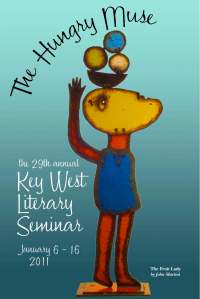But is it literary?
 The Key West Literary Seminar is underway -- we just wrapped up the first session; there's still room in the second session and if you're a literary foodie at all, this is one of those rare opportunities for your passions to combine. One topic that keeps coming up, as it has since we began discussing food as a theme for the Seminar, is the question of literariness (if that's a word). One of my fellow board members, whom I respect a lot and like even more, dislikes it when the writers get off the topic of writing and literature and just start talking about food.
I disagree. And here's why:
The Key West Literary Seminar is underway -- we just wrapped up the first session; there's still room in the second session and if you're a literary foodie at all, this is one of those rare opportunities for your passions to combine. One topic that keeps coming up, as it has since we began discussing food as a theme for the Seminar, is the question of literariness (if that's a word). One of my fellow board members, whom I respect a lot and like even more, dislikes it when the writers get off the topic of writing and literature and just start talking about food.
I disagree. And here's why:
First of all, there is plenty of talk about writing itself and to be honest, a diet of just that gets to be too much for me, especially since we're dealing with a double session here.
Second, we have gathered some of the smartest, most articulate people in the country who know from food. Why on earth would we NOT want them to talk about this subject, about which they are passionate and knowledgable -- and often quite funny. Not just the known funny people like Calvin Trillin, Roy Blount and Billy Collins, but Julia Reed was a revelation to many of us -- the woman should have her own standup act -- and even an eminence such as Madhur Jaffrey had the auditorium laughing out loud many, many times. Isn't their foodiness the very reason we brought them, along with their proven literary chops? When the subject is "more literary," say a genre like memoir, we don't object when the writers discuss some topic that is the focus of their work, do we? The whole point of the Seminar, to me, is to hear directly from the writers telling stories, about themselves, their own work and about other people, stories that are funny or sad or significant in some way. It's stuff you just wouldn't hear otherwise and it is very different hearing spoken by the writer herself than it is reading on the page.
I may be a bit oversensitive, having come from journalism and feeling like nonfiction generally is considered a literary stepchild compared to the exalted realms of fiction and poetry. And there were a few times when I agreed that the discussion veered a bit too far into the purely topical -- once about America's current crises in obesity and diabetes -- but in most cases that was driven by questions from the audience and I don't see what either the Seminar planners nor the writers can do about that.
So overall -- a rousing success, I must claim on my own behalf and that of the people who did most of the work putting this thing together, namely Miles Frieden and Arlo Haskell. There's still room to sign up for the second session, which I'm excited about -- it's going to be interesting to hear the new voices in the mix, especially the novelists (Kate Christensen, Elizabeth Berg and Nicole Mones) as well as a more historical perspective from Mark Kurlansky. And I'm excited to hear more from Madhur Jaffrey -- she's one of those people you could listen to all day even when she's just describing how to create a simple rice dish.
And here, to whet your appetite, are some of my personal highlights from the first session:
"It took a long time for American writers to feel comfortable admitting that they were actually writing about food."
and,
"It's ironic that, just as people stopped cooking they started reading cookbooks."
-- Ruth Reichl in the opening keynote address
Jonathan Gold said he hates the term "ethnic" when applied to restaurants. "Nobody ever calls French cooking ethnic."
We had Julia Child impressions from at least four the panelists -- the best by far was from Judith Jones; the worst was Roy Blount, Jr.
Diana Abu-Jaber describing the adoption of dishes from different cultures into the American diet, such as hummus with roasted red peppers in the grocery store: "There's fusion and I guess you'd call it confusion."
"The reason there's a taboo against cannibalism is that it must have been a powerful temptation."
-- Jason Epstein, after quoting a chef who says chefs cook for other people "so they don't eat us."
Someone asked Madhur Jaffrey if we should travel to India or if it's been ruined. She replied that India is like an onion with many layers existing together, from medieval to 21st century. "It is a rich, irritating, uplifting experience to go to India," she said. She recommends it.